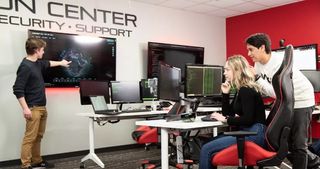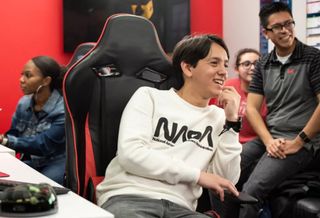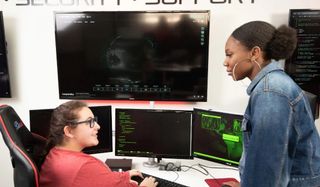When Maryville University in St. Louis opened its grant-funded Cyber Fusion Center in 2016, the institution’s leaders knew a successful program was being launched but had no idea just how valuable it would become. Given that nearly every company now conducts business digitally, the risk around security continues to proliferate. The Cyber Fusion Center gives students a front-row, hands-on learning experience.
“We provide cybersecurity services to about 20 organizations,” says Tammy M. Gocial, Ph.D., associate academic vice president and interim dean for Maryville’s John E. Simon School of Business. “We help them understand their potential vulnerability from a cyberattack and offer them support to shore up where they might be vulnerable.”
A physical lab in which Maryville students get real-world experience in data analytics and cybersecurity training, the Cyber Fusion Center also allows students to work remotely, handling everything from penetration testing and vulnerability management to digital forensics and cyber threat monitoring.
Maryville has been a front runner in online learning, having built a robust model seven years ago. Several thousand students have taken online classes, and the college prides itself on delivering strong courses in traditional and cutting-edge disciplines.
“We have 700 students who major in cybersecurity, both undergraduate and graduate, and they were able to adapt to online classes this past semester,” says Mark Lombardi, Ph.D., president of Maryville. “Through these programs we’ve reached an even greater educational awareness about the new environment we’re operating in that relies on everything from Zoom meetings to transferring information electronically.”
According to Lombardi, the pandemic has highlighted the importance of the cybersecurity program, proving yet that these kinds of skills are in tremendous demand in every industry. During the last few months of distance learning, students continued their work remotely and didn’t miss a beat. Even though some of the not-for-profits they serve did not need as much assistance, the students learned to handle different types of threats such as people hacking into Zoom meetings. “As the tactics and strategies shifted, our students adapted,” says Lombardi.

Solving real-world challenges
Students can take Cyber Fusion Center courses as an elective and receive course credit or as an internship; either way, they get hands-on experience while developing crucial skills in computer forensics, ethical hacking, and information security.
The center is managed by faculty experts and staffed by students who are enrolled in Maryville’s online Bachelor of Science in Cyber Security program or online Master of Science in Cyber Security program.
As a result of the pandemic, Gocial says students are doing more with ethical hacking and helping companies navigate phishing. “With most of the workforce working from home, lots of people are mixing business and work on the same computer,” says Gocial. “People are ordering online and hackers are getting better and better at spoofing legitimate companies, especially Amazon.”
Maryville students identify these types of situations and devise ways to help companies educate their employees about what to look for and how to avoid being scammed.
After an air force base in Illinois that was tasked with building up its cyber protection asked Cyber Fusion Center students to try to hack it, a space for students to practice ethical hacking was launched. “It’s like a network sandbox,” says Gocial. “It’s a lot of fun for the students and they love the challenge!”
Overall, she says students develop a lot of synergy by working on Center projects. “With cybersecurity, there’s so much problem-solving and analysis that it’s very collaborative,” Gocial says. “It used to happen in person but now it’s happening through Zoom meetings.”


